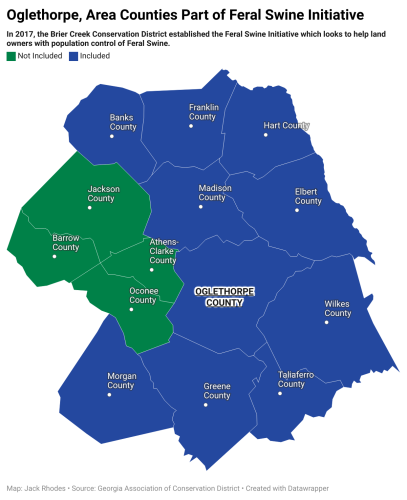Wild hogs carry diseases that are harmful to humans
Deer season ended Jan. 8, causing some in Oglethorpe County to turn toward alternate sources of meat — like feral swine.
Nature’s Harvest Meat Co., which processed more than 3,000 deer this past season, has seen an uptick in demand for feral swine. But, this increase has led to concerns about people attempting to process the wild pigs themselves.
“I don’t want people to get sprayed by anything that could have bloodborne pathogens,” said Don Uldrich, co-owner of Nature’s Harvest. “If you get it in your eye, you’ve got a problem for the rest of your life.”
The U.S. Department of Agriculture Wildlife Services collected data on feral swine in Georgia from April 2020 through May 2022. It found that over a quarter tested positive for either pseudorabies or swine brucellosis.
Brucellosis is a bacterial disease that can be transmitted through close contact with feral swine. The Centers for Disease Control and Prevention warns it can cause severe health problems, including death, if not treated properly.
The best way to prevent the disease? Completely avoid direct contact with feral swine.
Uldrich said even he is hesitant to process feral pigs, and he will only consider it if they have been properly field dressed. He said it’s important to make sure anyone attempting to process feral swine is properly trained, but they should still proceed with extreme caution — or not at all.
Nature’s Harvest recently posted to its Facebook account a link to the USDA Wildlife Services data that provides a list of “simple measures” hunters should take. This includes wearing proper safety gear, disinfecting work areas and completely disposing of the animal remains.
Oglethorpe County is a part of the Georgia Association of Conservation Districts Feral Swine District Initiative, which was established in 2017 to prevent further damages to land from feral swine.
Even with this program, the population has been difficult to control with around 600,000 feral swine predicted to be in the state of Georgia.
“If you were able to kill a herd that was causing disruption on your property and you left one female behind, just in a matter of months the numbers that would come from that one individual hog is just mind blowing,” said Shanna Reynolds, county extension coordinator.

